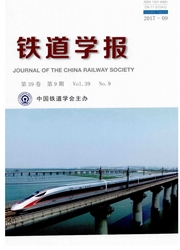

 中文摘要:
中文摘要:
对于频率受限的铁路数字移动通信系统GSM-R(Global System for Mobile-Railway),频率规划问题至关重要。以往的频率规划方法普遍存在精确度低、复杂度高的问题,这将不能满足对精度和时延有较高要求的铁路数字移动通信系统。本文基于铁路数字移动通信系统特性,引入粗糙集理论和灰色聚类理论,综合多种电波传播模型,确定影响频率规划的属性,衡量每个属性的权重及其门限值,并对各种可行的频率规划方案进行灰聚类评估,进而给出最优的频率规划方案。最后结合实际工程建设情况和仿真平台,对多种频率规划方法进行对比。理论推导和仿真证明,这种频率规划方法可以提高电平和干扰矩阵估计的精确度。
 英文摘要:
英文摘要:
In the frequency-limited GSM-R(Global System for Mobile-Railway) system,frequency planning is a key problem that affects the network quality.In the available literature,the algorithms usually assume that the samples follow a certain distribution,whose disadvantages lie in low accuracy and high complexity.The paper presents a frequency planning method according to the characteristics of GSM-R.By the research of wireless channels for reference,we introduce the Rough Sets(RS) theory and Grey Clustering(GC) theory into frequency planning and expound the factors affecting frequency planning and their thresholds.Then,the optimal plan is given by means of the Grey Clustering Assessment.Eventually,the simulation shows the compared performance of frequency plans.The derivation and simulation results show that frequency planning based on the Grey Rough Sets is more precise.
 同期刊论文项目
同期刊论文项目
 同项目期刊论文
同项目期刊论文
 期刊信息
期刊信息
